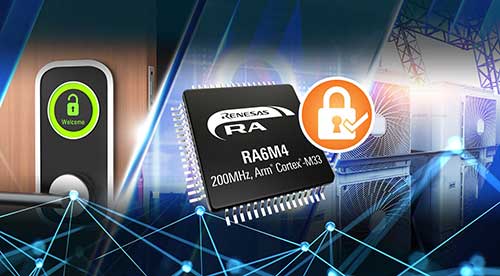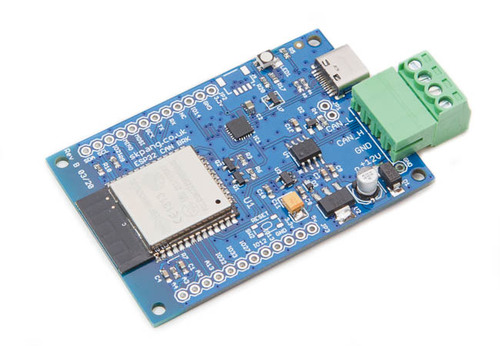Recent Posts
Arm Cortex Based MCU With Advanced Security For IoT (Internet of Things) Applications Supports Two CAN Bus Interfaces
Posted by on
Renesas announced its RA6 series of MCUs (Micro Controller Unit) with nine RA6M4 MCUs. The ARM Cortex-M33-based RA6M4 series comes with advanced security features for IoT (Internet of Things) applications and supports two CAN Bus Interfaces.
The 32-bit MCUs expand operating performance up to 200 MHz using the ARM Cortex-M33 core based on Armv8-M architecture with ARM Trustzone technology. The RA6M4 MCUs achieve security and connectivity maintained by the Flexible Software Package (FSP). The company’s partner ecosystem offers software and hardware building blocks that work with RA6M4 MCUs and FSP to address Industrial 4.0, building automation, metering, healthcare, and home appliance applications. The series supports the Classical CAN 2.0 Standard, which includes the extended frame format with a 29-bit identifier used in SAE J1939.
The Secure Crypto Engine delivers security solutions, incorporating multiple symmetric and asymmetric cryptography accelerators, key management, security lifecycle management, tamper detection, and resistance to side-channel attack, in addition to the ARM Trustzone technology. These integrated security features make the MCUs suitable for connected applications, particularly the Internet of Things (IoT).
Built on a 40-Nm process, the MCUs drive power consumption goes down to 99 uA/MHz while running the Coremark algorithm from flash. The MCUs also support wake-up times of 30 µs from standby using the on-chip oscillator. The integration of up to 1 MiB code flash memory and 256 KiB of SRAM (64 KiB with ECC) also make the MCUs well suited for low power and safety applications.
The MCUs with FSP allow customers to re-use their legacy code and combine it with software from partners across the vast ARM ecosystem to speed implementation of connectivity and security functions. The FSP includes FreeRTOS and middleware, offering a device-to-cloud option for developers. These out-of-box options can be replaced and expanded with other RTOS or middleware.
The FSP provides tools for developing projects targeting the MCUs. The e2 studio integrated development environment provides a development cockpit that manages the crucial steps of project creation, module selection and configuration, code development, code generation, and debugging.
Key Features
- 120MHz ARM® Cortex®-M4
- 512kB Flash memory and 256kB SRAM
- 8kB Data Flash to store data as in EEPROM
- Scalable from 64-pin to 100-pin packages
- Capacitive touch sensing unit
- USB 2.0 Full Speed
- CAN 2.0B
- SCI (UART, Simple SPI, Simple I2C)
- SPI/ I2C multimaster interface
- SDHI
- SSI/Serial sound interface
ESP32 WiFi, Bluetooth Classic, BLE, CAN Bus Module
This board comes with an onboard ESP32 WROOM-32 WiFi, Bluetooth Classic, BLE Module, and a CAN Bus port with a transceiver. Onboard is an RGB LED, IO pins on a 0.1" pad.
Programming is accomplished through the popular Arduino IDE connected to the USB-to-Serial converter with USB-C connector, automatic bootloader and reset.
The ESP32 is a series of low-cost, low-power system-on-chip microcontrollers with integrated Wi-Fi and dual-mode Bluetooth. The ESP32 series employs a Tensilica Xtensa LX6 microprocessor in both dual-core and single-core variations and includes built-in antenna switches, RF balun, power amplifier, low-noise receive amplifier, filters, and power management modules.
 Loading... Please wait...
Loading... Please wait...


